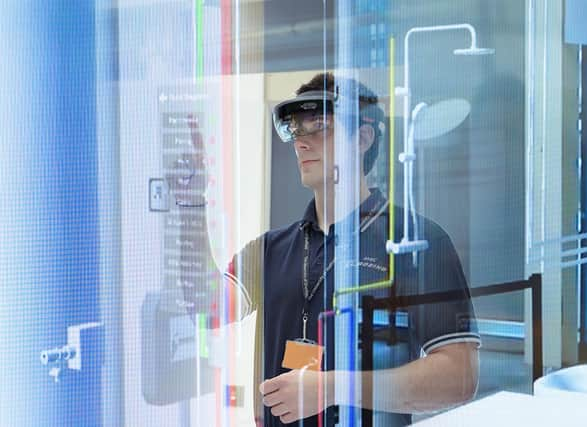AMRC staff respond to ventilator ‘challenge’


FUTURISTIC headsets enabling production line workers in other sectors switch to making ventilators have been shipped from Rotherham to sites across the UK.
The augmented reality equipment is helping to manufacture thousands of the life-saving breathing aids as the coronavirus crisis heads towards a peak in this country.
It follows PM Boris Johnson’s plea for 50,000 more ventilators to be delivered to the NHS over the next few weeks.
Within hours of the challenge being issued, Rotherham’s Advanced Manufacturing Research Centre and Nuclear AMRC had received scores of requests for help.
The high-tech equipment being provided initially designed for videogames features software from American partner firm PTC.
It guides makers in industries like aerospace and automotive on how to produce ventilators.
Rather than putting headset wearers in a fully computer-generated world like virtual reality does HoloLens allows users to place 3D digital models in the room alongside them.
“What we are seeing in South Yorkshire is part of a truly nationwide and global response to the Covid-19 pandemic,” said Prof Rab Scott, AMRC head of digital.
“HoloLens and mobile devices will run PTC’s app to create and share training content, giving workers guided instructions in how to set up the new production processes needed to make the ventilators.
“In addition, Microsoft’s Dynamics 365 Remote Assist will offer hands-free video-calling on the HoloLens to let operators collaborate with experts on a PC or mobile device.”
Meanwhile machining staff were scrambled back to the factory floor at the AMRC to make parts designed in Luton to help scale up existing ventilator production lines.
AMRC engineering manager Phil Kirkland said: “It was an incredible team effort and shows just how agile and responsive we can be, even in the middle of a global lockdown.
“With just four days to turn things around, a ten-strong team including essential maintenance, first aid and fire marshal cover worked to a combination of 2D drawings and 3D models with support provided remotely by engineering and management staff.”
Prof Koen Lamberts, president and vice-chancellor of the University of Sheffield, said: “The AMRC and Nuclear AMRC have always been at the forefront of using innovation to respond to the most pressing challenges.
“We are incredibly proud of how our staff have risen to this challenge by supporting the design and manufacture of new ventilators and other vital medical equipment at this time of national emergency.
“The Ventilator Challenge UK consortium is a prime example of what can be achieved when industry, academia and government work together. This approach will remain a critical element in the UK’s crisis response and recovery.”
AMRC and Nuclear AMRC are part of the High Value Manufacturing Catapult alliance of leading research centres.
Catapult chief executive Dick Elsy said: “What we are seeing here is a truly collaborative, international effort, with the best and brightest engineering and manufacturing brains coming together to rally all their resources in response to the distress signal from the NHS.”